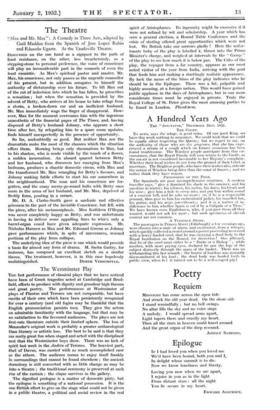The Theatre
"Max. and Mr. Max"; A Comedy in Three Acts, adapted by
Coil Madden from the Spanish of Jose Lopez Rubio and Eduardo Ugarte. At the Vaudeville Theatre.
DISGUISED on the one hand as a signpost to the path of liast resistance, on the other, less- treacherously, as a s'tepping-stone to personal preference, the voice of conscience Will play no inconsiderable part in the counsels of even the least casuistic. As Max's spiritual pastor and master, Mr. Max, his conscience, not only passes as the ungentle counsellor of his -present, but in addition arrogates to himself the authority of dictatorship over his future. To lift Max out of the rut of indecision into which he has fallen, he prescribes a sensation ; but when the sensation is provided by the advent of Betty, who arrives at his house to take refuge from a storm, a broken-down car and an inefficient husband, Mr. Max immediately wags the finger of disapproval. How- ever, Max for the moment overcomes him with the ingenious anaesthetic of the financial pages of The Times, and, having disposed of Betty's husband Johnny, who appears a short time after her, by relegating him to a spare room upstairs, finds himself unexpectedly in the presence of opportunity.
So far, undoubtedly so good. But neither Max nor the dramatists make the most of the chances which the situation offers them. Morning brings only rheumatism to Max, but to his shadow, who is made visible by the touch of a flower, a sudden incarnation. An absurd quarrel between Betty and her husband, who discovers her emerging from Max's bedroom, produces a chaotic domestic circus, with Max and the transformed Mr. Max wrangling for Betty's favours, and Johnny making futile efforts to start his car somewhere in the neighbourhood. The man and his conscience are for- gotten, and the crazy merry-go-round halts with Betty once more in the arms of her husband, and Mr. Max, deprived of fleshly form, pouting in a corner.
- Mr. D. A. Clarke-Smith gave a sardonic and effective grimness to the part of the invisible Conscience, but fell, with the piece, after his metamorphosis. Miss Kathleen O'Regan was never completely happy as Betty, and was unfortunate in having to deliver some appalling lines to which only a barrel-organ could have given adequate expression. Mr. Nicholas Hannen as Max and Mr. Edmund Gwenn as Johnny gave performances which, in spite of unevenness, rescued portions of the play from collapse.
The underlying idea of the piece is one which would provide a basis for almost any form of drama. M. Sacha Guitry, for instance, has composed an excellent sketch on a similar theme. The treatment, however, is in this case hopelessly






































 Previous page
Previous page